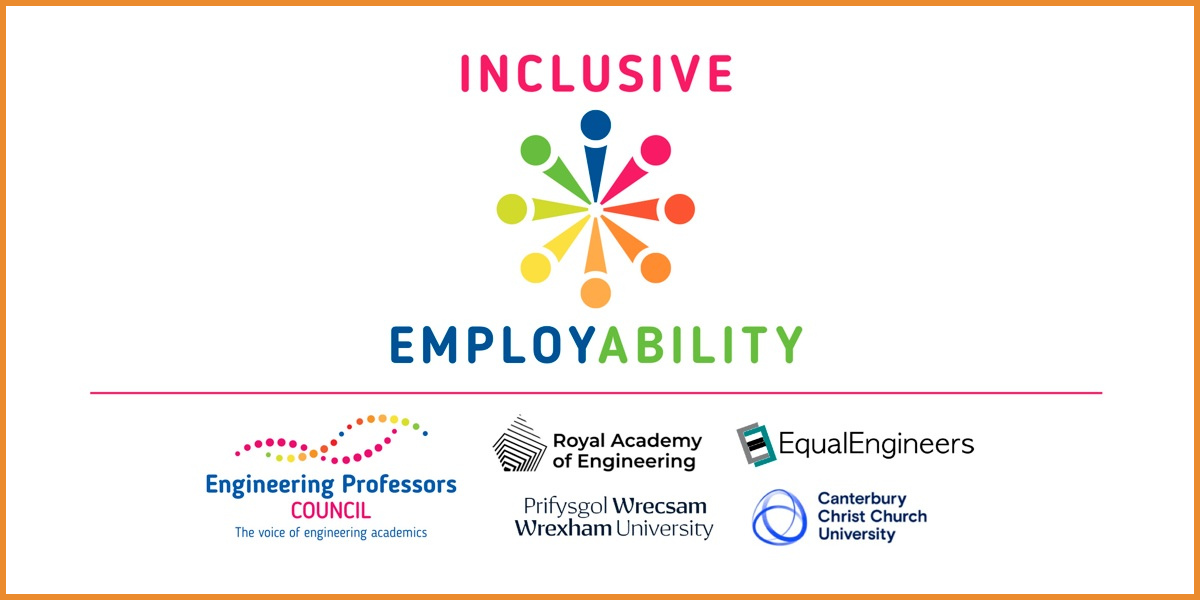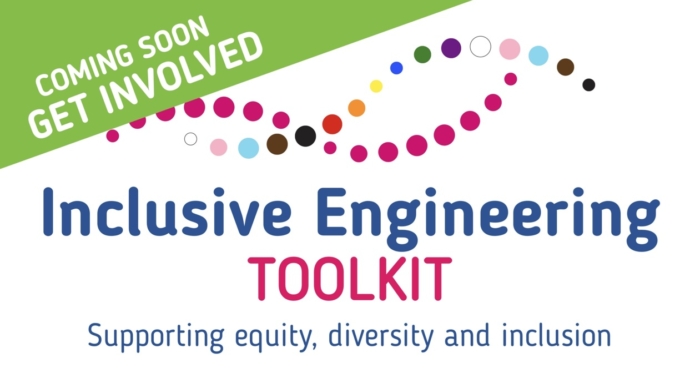The EPC’s Inclusive Employability Toolkit is supported by Canterbury Christ Church University, Equal Engineers, The Royal Academy of Engineering, and Wrexham University. This resource is designed to help engineering educators integrate EDI principles and practices in engineering, computing, design and technology – across education, employer engagement, career preparation, and progression into the workplace.
Introduction
This resource was formerly known as the EDGE Toolkit, and was developed in partnership with Canterbury Christ Church University, Wrexham University, Equal Engineers and The Royal Academy of Engineering. The two Universities have now joined forces with the Engineering Professors Council to launch the newly renamed Inclusive Employability Toolkit, working together to improve usability and ensure broader access to this valuable resource.
The Inclusive Employability Toolkit supports inclusive employment in engineering, computing, design, and technology, enhancing diversity and authentic voices in the workplace.
Our commitment to fostering an environment where every individual feels valued and empowered has led us to develop the Inclusive Employability Toolkit. This comprehensive toolkit is designed to guide students, faculty, and staff in understanding and practicing EDI principles, ensuring that our campus is a place where diversity thrives and every voice is heard.
The Inclusive Employability Toolkit is more than just a set of resources – it’s a commitment to continuous learning, understanding, and action. We invite you to explore the toolkit, participate in the activities, and engage with the wealth of available resources. Together, we can build an engineering community that truly reflects the world’s diversity, united in our pursuit of equity and inclusion.
Begin by exploring this page; it provides a comprehensive background on the importance of EDI in the world of engineering and sets the stage for your learning journey.
Welcome
The world is incredibly diverse, but navigating the complexities of equity, diversity, and inclusion (EDI) can be challenging, especially for minority groups who face significant hurdles. In the video below, Professor Anne Nortcliffe invites you to explore the Inclusive Employability Toolkit, offering guidance on how to make the most of its features and resources.
The Inclusive Employability Toolkit aims to
- Empower individuals to circumvent hurdles and deal with challenges they may face.
- Educate together core concepts of EDI allyship to benefit of all of society.
- Equip individuals with the tools and knowledge to enable inclusive environment. Encourage individual ongoing reflection, growth, and active participation in EDI initiatives.
Contents
How to use this toolkit effectively:
Embarking on your journey through Inclusive Employability Toolkit is a step towards fostering an inclusive and diverse environment within the engineering community. This guide will help you navigate the toolkit, ensuring you make the most of the resources, challenges, and learning opportunities it offers.
- Activities: Explore each activity, designed to deepen your understanding and application of EDI principles across contexts. You can also explore our University Career Services Library here, where you’ll find a range of helpful resources.
- Reflect and grow: Use this tool to gauge your current understanding and identify areas for growth.
- Next steps: Guidance on continuing your EDI learning journey, including resources from Wenite and Equal Engineers.
- Case studies: Case studies on inclusive employability for application in educational and teaching contexts.
- Blogs: Personal experience, news and updates on the Inclusive Employability Toolkit.
- Get involved: A guide to how you can contribute to the Inclusive Employability Toolkit and community.
- Our contributors: We’d like to thank all our contributors for making this toolkit such a valuable resource.
- Our supporters: We’d like to thank Canterbury Christ Church University, Equal Engineers, The Royal Academy of Engineering and Wrexham University for supporting this project.
Goals
🌍 Diversity matters: The toolkit emphasizes that diverse voices enrich the workplace, offering unique perspectives that drive innovation and creativity.
💪 Empowering students: By focusing on technical students, the toolkit equips them with the skills and confidence to navigate their career paths successfully.
🎤 Encouraging authenticity: Bringing your authentic voice to work fosters an environment of trust and openness, leading to stronger team dynamics.
🤝 Role of allies: Supporting individuals from minority backgrounds (female, LGBTQ, disabled, mature, low socio-economic status, global majority) not only aids their success but enriches the workplace culture for everyone involved.
📈 Business impact: Companies that prioritise equity and inclusion see improved employee retention and higher morale, translating into better performance metrics.
🛠️ Better solutions: Diverse teams in engineering and technology are proven to develop more effective solutions, addressing a wider range of needs and challenges.
🏛️ Societal benefits: Promoting equity and inclusion not only benefits organisations but also contributes to a more just and equitable society overall.
Licensing
To ensure that everyone can use and adapt the toolkit in a way that best fits their teaching or purpose, most of this work is licensed under a Creative Commons Attribution-ShareAlike 4.0 International License. Under this licence you are free to share and adapt this material, under terms that you must give appropriate credit and attribution to the original material and indicate if any changes are made.
Further details
Gain insights from industry employers as they discuss the toolkit and its impact. Gain insights from students as they reflect on the usefulness and impact of the toolkit.
![]() To leading the charge in creating new opportunities for diversity and inclusion of engineering, technology and design to address regional skills gap. Our vision for all engineering, technology and design students regardless of their background have opportunity to thrive in engineering, technology and design industry.
To leading the charge in creating new opportunities for diversity and inclusion of engineering, technology and design to address regional skills gap. Our vision for all engineering, technology and design students regardless of their background have opportunity to thrive in engineering, technology and design industry.
![]()
![]()
![]()
![]()
![]()
![]()
![]()
Please note: Discussions around discrimination, prejudice and bias are highly complex and part of a much wider national and international debate, including contested histories. As such, we have limited the scope of our resources to educating and supporting students.
The resources that the EPC and its partners are producing in this area will continue to expand and, if you feel there is an issue that is currently underrepresented in our content, we would be delighted to work with you to create more. Please get in touch.
Any views, thoughts, and opinions expressed herein are solely that of the author(s) and do not necessarily reflect the views, opinions, policies, or position of the Engineering Professors’ Council or the Toolkit sponsors and supporters.




